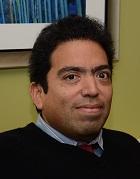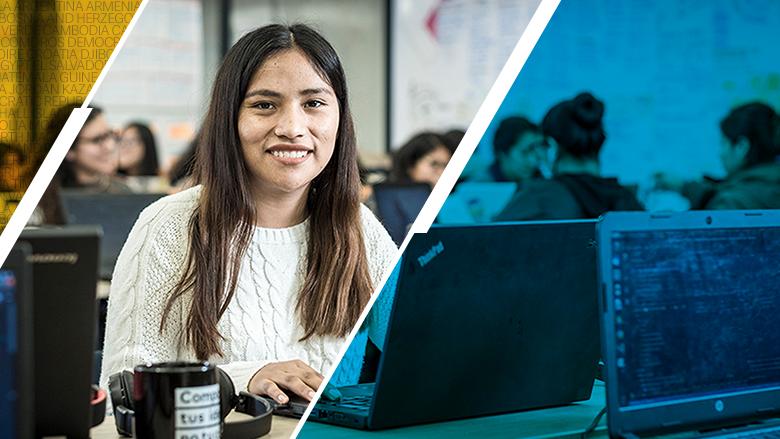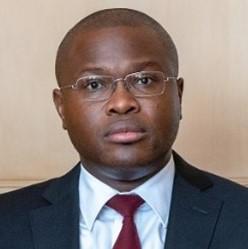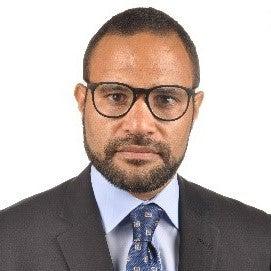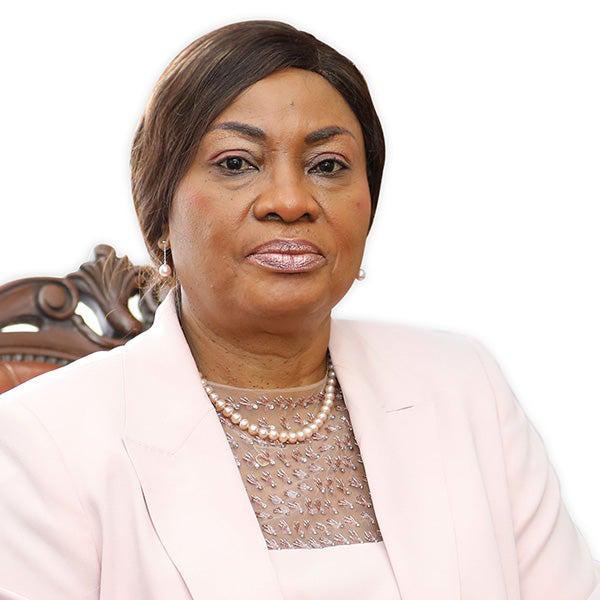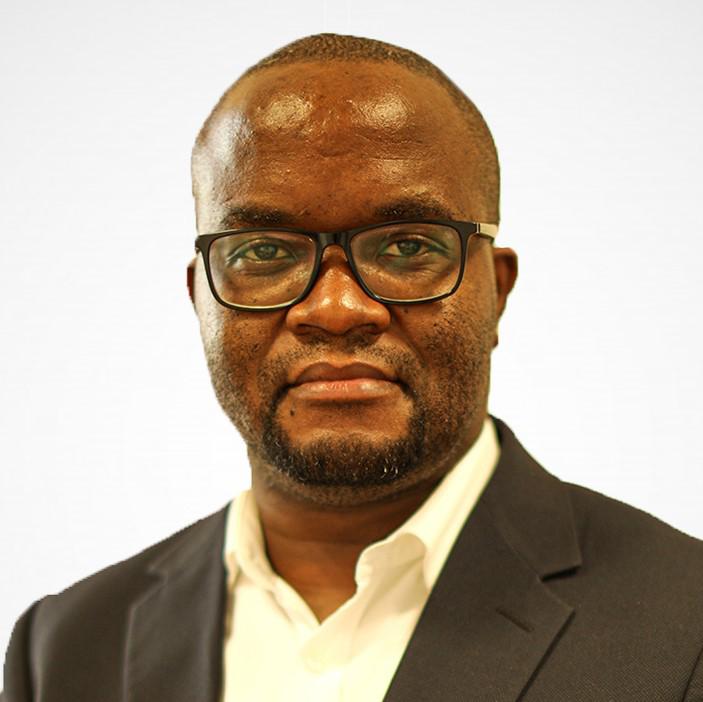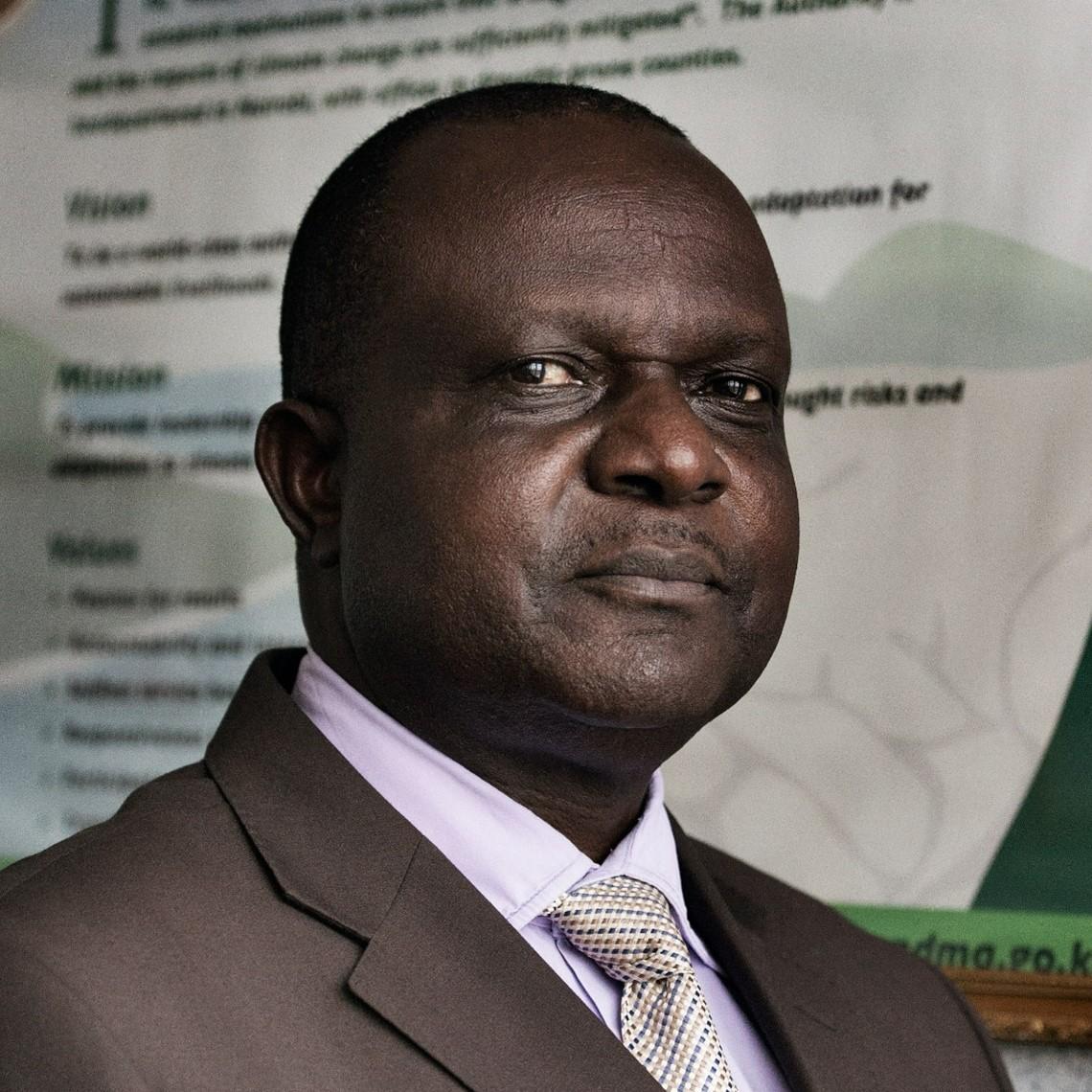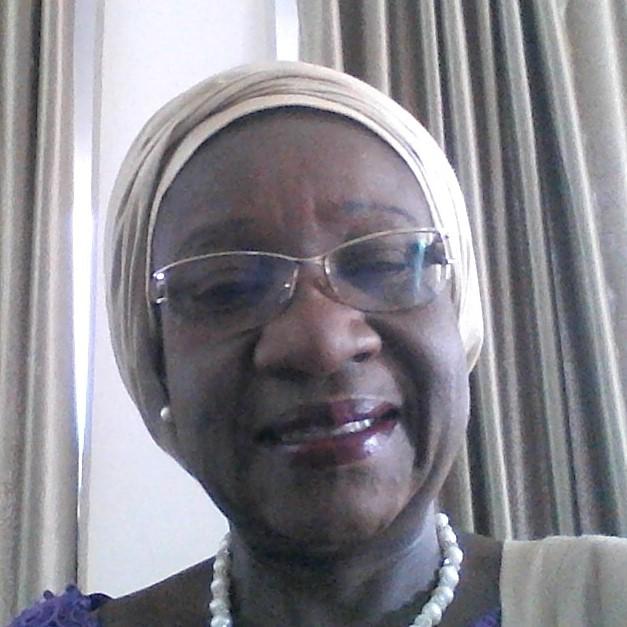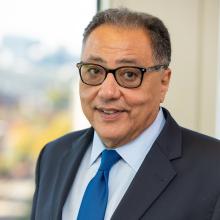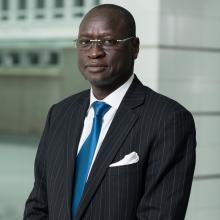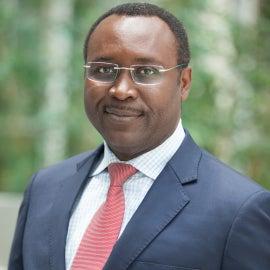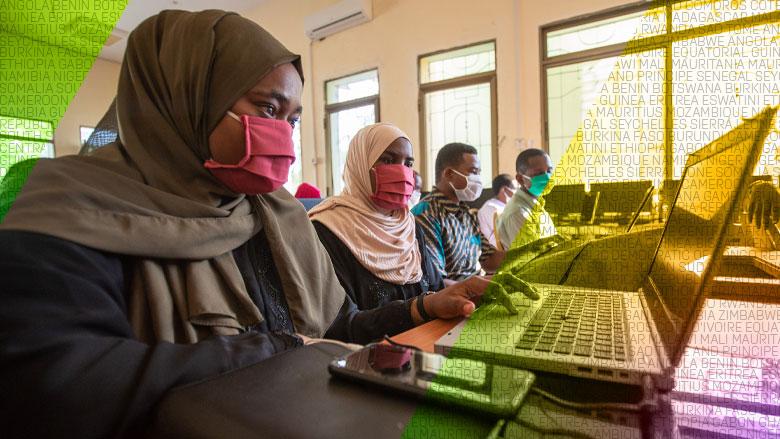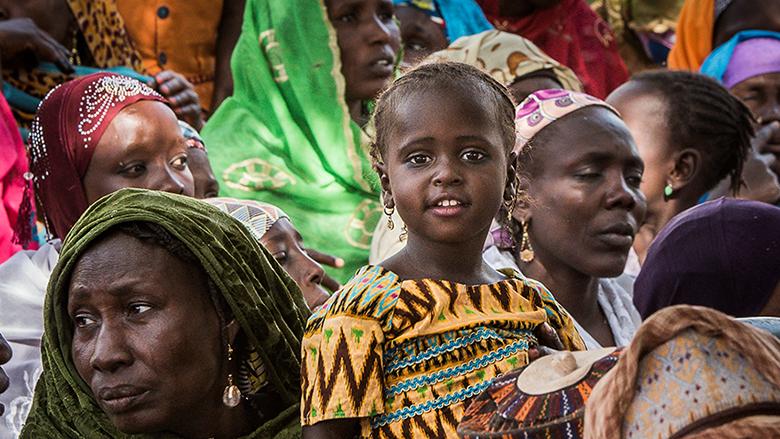[Dominique Tchimbakala]
Good morning, good afternoon, good evening, everyone watching from around the world. I wish you a warm welcome to the State of the Africa Region event, part of the World Bank-IMF Annual Meetings. My name is Dominique Tchimbakala and I'm delighted to be your host today as we navigate through discussions with a distinguished panel of African policy makers, civil society organizations, leaders and youth. This event follows the launch of Africa's Pulse, which is released twice a year and provides an analysis of the near-term macroeconomic outlook from the region.
Today, we will get a review of the macroeconomic situation in the region, given the recent fluctuations in commodity and food prices. We will turn our focus to how social protection strategies can boost resilience in African economies and create jobs as they recover from multiple shots in current troubled times. But before we begin, I would like to share several ways you can engage throughout this event.
First of all, this event is being broadcast in English, French and Portuguese. We have experts on the live chat right now ready to interact with you and answer your questions. Again, you can engage in conversations on social media using the hashtag, #AfricaSOR, S-O-R. Finally, I will pull it up and running, you'll find it on the World Bank Live page and our Twitter channels. There is still of time to participate and we will share the results at the end of the program.
Well, we are ready, looking forward to hearing from you. And without much further ado, it's my pleasure to hand it over to Ousmane Diagana, the World Bank Regional Vice President for Western and Central Africa and Hafez Ghanem, the World Bank's Regional Vice President for Eastern and Southern Africa. Hello and welcome. The floor is yours.
[Ousmane Diagana]
Thank you very much, Dominique. Good morning, good afternoon, good evening, everyone. It's a pleasure to join this panel and on behalf of my friends, Hafez and Albert, I would like to welcome everyone. In particular, I thank the ministers and all friends joining this important conversation.
At the onset, I would like really to commend Albert and his team for making this event a tradition and one of the highest moments for our annual gathering, I will say even, semester gathering happening around our Spring Meetings and our Annual Meetings.
The topic to be discussed this morning with you is both boring and also of constant relevance of our Africa. In fact, boosting economic resilience through social protection programs in this period is key for the African economy, for the population at a time when the countries are trying to rebound after those crisis, unfortunately, a crisis that continues.
As you know, before COVID 19, we had seen some encouraging progress in the many African countries. However, the pandemic’s economic and social impacts have been devastating and far reaching. Therefore, in the face of a turbulent and trouble time, it's very important that we stay focused, that we act and do so in a fast manner.
We know that social protection programs have always played a key role in uplifting families out of poverty. We have important program, therefore, in almost every single country in Africa, and we need really to push this and to scale up also the programs that we have developed. To do so effectively and efficiently, your advice, honorable participants at this panel, and your guidance will be critical. I'm looking forward to the discussion and now, let me turn to my friend, Hafez.
[Hafez Ghanem]
Thank you very much, Ousmane and Dominique, and a warm welcome to all of our panelists and participants and everybody who is connected today. I think Ousmane said it all, but I just wanted to highlight that this is a very special time for us in Africa and looking just at East Africa, what has been happening over the last three years. In 2019, we were hit by the locusts. Then, after the locust invasion, we got COVID. After COVID, now, we have droughts, and it addition to the drought, many of our countries have been hit by cyclones. So we have some countries like Ethiopia suffering from drought, other countries like South Sudan suffering from flooding. We have all of those natural disasters and natural shocks, which, I'm afraid, everybody tells me, are going to increase in frequency because of climate change.
At the same time, we have some man-made shocks. Man-made shocks in the form of civil strife, so some manmade shocks made by us in Africa, civil strife politic uncertainty, upheavals, coups d'état. There are also man-made shocks that come from outside of Africa like the war in Ukraine, which has led to higher wheat prices, higher fuel prices, higher fertilizer prices, and has added to all the other shocks.
Dealing with everything that's happening in our world today and how to make Africa more resilient to the shocks around the world is extremely important and I'm really looking forward to our discussion and to hearing from all of our distinguished panelists, so that together, we can think about what are the best solutions for Africa and how can we make our continent much more resilient to all those shocks. So thank you again and I hope and I'm looking forward to the discussion today. Now, I should pass it over to Albert.
[Albert Zeufack]
Very good. Thank you so much, Hafez and Ousmane. The state of the region, as Ousmane has said, is really this opportunity, this platform to share what is happening on the continent, economy wise. I'll take these few minutes to share with you the key findings of the latest Africa's Pulse, the 25th edition. This edition is coming out with five messages.
The first is that Africa has exited the COVID led recession in 2021. We are projecting the continent will grow at around 4% in 2021 and positive per capita growth is back on the continent for the first time since 2016 and I think this is good news.
Now, 2022 will see a deceleration in growth. It's going to be a different story. 2022 will see growth slowing down to 3.6%, still above per capita, still positive per capita growth, but this slowdown in growth will capture the global deceleration in growth, will also capture all the shocks Hafez has just talked about: climate related shocks, the COVID shock, which is still slowing down production in Asia and disrupting supply chains, continuing to disrupt supply chains in Asia, one of our biggest trade partners, but also the shock related to the latest crisis in Ukraine. Those shocks will lead to a deceleration in growth in Sub-Saharan Africa.
Third message is that despite the uncertainty and the gloomy global conditions, there will be opportunities for some African countries. Resource rich African countries will actually be able to benefit from this situation to grow faster. Angola, for example, will exit the long lasting recession. Angola will grow out of recession for the first time since 2016. Countries like Nigeria will grow faster in 2022. Countries that are also diversified like Côte-d'Ivoire, Senegal, Benin, will actually all grow faster. This is important to notice that despite these gloomy conditions, there will be opportunities for some African countries, and this is essentially because we have seen a growth in commodity, a positive shock on commodity prices across all categories, across all classes of commodities.
The shock on Ukraine will therefore not impact Africa, at least at this point, too much through the growth channel, but through inflation and through civil strife in countries, as this will essentially affect urban populations and urban vulnerable populations. This is going to be the biggest risk we see to our macroeconomic outlook, is going to be the risk of civil strife, but it's also going to be the risk of stagflation, which is slow growth in a high inflation environment.
Fourth message, what is the policy package that Africa's policy is advising? We are advising countries to use fiscal policy and trade policy quite aggressively. On trade policy, let's make sure we don't repeat the mistakes of the past. Let's not close borders, let's not limit export of food and grain. Instead, let's take this as an opportunity to deepen intra-Africa trade and deepen the continental free trade integration.
On fiscal policies, despite the limited fiscal space, we need to walk to assist the populations that will be the hardest hit through reduction in import duties on food, for example, and many other fiscal supports that governments can afford to do at this point.
The second package is monetary policy. We need to use monetary policy wisely because this is going to be a serious challenge to either fight inflation aggressively by raising interest rates or making sure we do not stifle growth and the recovery.
The third important tool is going to be the use of social protection, and that's the special topic of this Africa's Pulse, countries need to deepen and widen social protection. The fifth message here is that social protection needs to evolve to face these new and really different shocks that our economies are facing. We need to evolve our social protection from social assistance to a more adaptive protection that would lead to protecting workers, including in the informal sector, but also a social protection program that can lead to more productive activities, as ultimately, the best social protection is a job, and a productive job.
Let me stop here. Back to you, Dominique.
[Dominique Tchimbakala]
Thank you. Thank you, Albert, for setting the scene for the discussion today. These are very important insights from the Africa's Pulse, which you can all access through the World Bank Live page.
Now, it's my honor to introduce you to Mohamed, a young boy from Somalia. Mohamed is a student in a Save the Children supported school and is part of a group of children from around the world who came together to inform the climate report, born into the climate crisis. In addition to climate change, Mohamed is also vocal in raising awareness about the importance of education within this community and among children in his school, so let's hear from him.
[Mohamed Barre Mo’alim]
My name is Mohamed Barre Mo’alim. I live in Liban Camp in Baidoa. I study at Liban School. I got displaced from Qansahdhere district in Bay Region. Inequality impacted us so much in terms of our livelihoods. It also impacted us economically and socially. Where we live, we don’t have good shelter. We are vulnerable to violence and thieves. We don’t have shelter from the rains and the hot weather. On the other side of the city, people live in villas and good buildings, not like us who live in makeshift houses. Rains and hot weather are not problems for them. They have transportation while I walk to my destinations. They live in good conditions. That is inequality. Climate change is impacting us. We have lost our farms. Our livestock have all died from the drought. It caused us to get displaced from our homes and come to Baidoa. As a family, we are experiencing those problems because of climate change. We need to get services like education, health, electricity and playgrounds. That can change the inequality that is existing now. The government is responsible for the people and their living conditions to provide education, health, electricity and playing grounds to us. The government can provide those services to solve the inequality among society.
[Dominique Tchimbakala]
Thanks you Mohamed for sharing your powerful message with us today. I just wanted to add some few words to say, from the COVID-19 pandemic to the war in Ukraine and its economy consequences, it can be said that the two previous years have broken the world into a turbulent zone. This is what we're going to talk in a few seconds, in this first panel of discussion, shaping Africa's economic future and building macroeconomic resilience in turbulent times.
Now, it's my pleasure to introduce our distinguished speakers, Romuald Wadagni, Minister of Economy and Finance, Benin, warm welcome to you, and Mário Caetano João, Minister of Economy and Planning, Angola, glad you could join us. Pauline Irène Nguene, Minister of Social Affairs in Cameroun, a warm welcome. Just precise that Hafez Ghanem and Ousmane Diagana stayed with us and will be invited to comment during the discussion.
Now, let's dive into the discussion with this first question to you, Mário Caetano João. The looming risk of stagflation, which is a combination of low growth and inflation, presents a trade-off to policy makers, high or not too high interest rates. Choosing to support a weak economy by lowering interest rates might lead to fewer inflation through high wages, so how would you keep inflation expectations anchored and ensure monetary policy credibility?
[Mário A. Caetano João]
Yes. Good morning or good afternoon, everyone. Thank you. Indeed, it's a difficult trade-off that's front of us, but it's also true that history has shown us successful cases also in which it was possible to keep the inflation low with low costs in terms of lost product.
However, for this to happen, it is largely necessary to better understand the transmission mechanisms of the monetary policy as well as the importance of managing our inflation expectations. The way economic agents expect prices to evolve in the future influences the way they spend, they borrow or they invest in the present.
The Central Bank, for example, here in Angola, is the one that is managing and is well prepared to better understand the inflation expectations and keep measuring it for the economic agents to make more informed decisions to keep the inflation rates low, stable and predictable.
When agents' expectations deviate from the central bank's inflation target, it finds it very difficult to influence the real reposition of prices in the economy and in order to inflation to return to the target level. The Central Bank, of course, how it happens here in Angola, they help to prevent agents from creating such expectations if it has clear objectives and keep the inflation case in that objective.
It's true that we decided to use a more flexible way of managing liquidity in the market, especially by creating some kind of dual approach of the monetary policy by creating some kind of dual interest rates because at one hand, we need to indeed prevent deflation by contracting the monetary policy, but on the other hand, we see that almost 60% of our inflation comes from food, so we need to produce food.
We had this dual approach especially by creating the two interest rates, one that is in the market for the most popular credit activities and the other one for food, which is, the difference is between 30% and 7%. So for food, if you want to seek finance from the bank to produce food, you will get a 7% interest rate, whereas for other activities, you'll get what is in the market, which is around 30%. This dual approach is actually helping us to manage the monetary policy and prevent it from increasing too much. Thank you.
[Dominique Tchimbakala]
Thank you. Thank you very much. Now, I want to ask a question to Romuald Wadagni, Senior Minister of Economy in Benin. Interest rates are rising globally amid tightening of monetary policy.
Can you hear me?
[Romuald Wadagni]
Yes, I can.
[Dominique Tchimbakala]
Yes. I was telling interest rates are rising globally amid tightening of monetary policy in advanced economies. This may lead to capital outflow or risings of rates and corporate spreads. This in turn may lead to massive exchange rate depreciation and rising inflation. How serious is this risk for your country and how would you deal with this situation?
[Translator for Romuald Wadagni]
I do agree with my colleagues from Angola's comments. Now, in this situation, the veritable cause of inflation has to do with supply, a supply shock. So when there is an inflation that exists, of course, interest rates go up, but in this special situation, it is something having to do with supply and it's as much more closely related to commodities, food, and also fuel. So in our approach, of course, we consider that there are certain products that we finance with the appropriate interest rates. In other cases, we need to have a certain flexibility in this context. We find that to be the most pragmatic approach. But we have to be accurate. In the case of Benin, which is part of WAEMU, we do not have a veritable independence of monetary policy, but we do conduct our monetary policy hand in hand with the seven countries of WAEMU. Now, what we do, is we have to watch, very closely, the trends and the evolution, and at the same time with his respect to inflation, and maintain the rates at a reasonable level. Of course, make sure that interest rates do not rise too much.
Now, some countries have access to international markets, both Côte d'Ivoire and Benin have access to international markets, but they are directly impacted by international rates, of course. This, in that case, becomes a veritable issue. So let's take the case of Benin. There, 50% of funding comes from outside the domestic market. We also have to deal with the increase in interest rates, and this is cause for concern for us because it makes our actions on the markets that much more complex and expensive, costly. The problem is also here. Of course, the IMF was very aware of the situation, and did elaborate the appropriate programs to bring some support, and also provide a short term access to financial markets for Benin. At the same time, we have availed ourselves of a mechanism to manage the situation, but we monitor very closely the interest rate trends. This has to continue. But of course, if interest rates continue to go up, that will make access to financing and funding that much more complex and difficult for the member states. Thank you.
[Dominique Tchimbakala]
Thank you, Minister Wadagni. Another question to Pauline Irène Nguene, Minister of Social Affairs in Cameroon. One way to avoid stagflation is to strengthen economic resilience. In this context, what policies do you plan to pursue to drive economic transformation in your country, and at the same time to address a challenge of jobs for the hundreds of thousands of African people entering the label market every year? Mrs. Nguene, can you hear me? You are on mute. Mrs. Nguene, you are on mute. We can't hear you. So now, it’s perfect. Yes, you can go ahead.
[Pauline Irène Nguene]
I'm sorry. I'm so sorry.
[Translator for Pauline Irène Nguene]
Thank you kindly, Madam Moderator. We have been fully involved in this very important exercise. You're absolutely right. This period of turbulence and of troubles that Africa is navigating, of course, all this means that we have to strengthen resilience in our economies. Cameroon has availed itself of a new strategy by 2030, which is based on four pillars, of which the first three, structural transformation of the economy, secondly, develop human capital and well-being, subsistence, and of course, the growth of the economy must be ensured.
Now, the fourth pillar has to do with governance, decentralization, and strategic management of the budget. With respect to the economy's structural transformation, the government means to have the appropriate measures adopted with this respect in agricultural sector, and of course, the digital economy, technology and TIC's. Of course, the economy of knowledge and by also supporting training from a technical standpoint, and vocational training from that standpoint. The objective here is to enhance, and enhance access to jobs, employment, and this through valuing enhancement of competencies and qualifications skills upgrading. Micro projects are drafted up in terms of investments, and of course, a number of investments at the big universities in our country. Have the business small hold agriculture, but also SME business owners, we have to support them appropriately, so that they may continue to thrive in the informal economy. Implementation. These types of initiatives is crucial, because that means a virtual inclusion of the socioeconomic considerations and human capital, which is crucial for the young people and for those categories of the population that are vulnerable in our society. So economic inclusion is vital.
In the past, we had committed to certain strategies, government strategies, to continue to support the economic inclusion of youth, and also try to dampen social appeal. Now, two million dollars were devoted to this, and it is for the use of young people in urban areas or semi urban areas, who have businesses in the informal sector. The minister of social affairs wants to continue on the implementation of the strategy, which we also set up at our ministry level, through one program which we call the program for support to integration, professional integration of the most vulnerable of our population. In partnership with the employment international fund. This is to provide disabled people, possibilities to have access to activities, and of course, micro credit for women so that they may be self-sufficient in their business, and also have, ultimately, access to salaried position. This, of course, through vocational training mechanisms. So, we wish, in the next few days, to call upon a dialogue, a discussion with the World Bank in order to fund these activities. Thank you kindly.
[Dominique Tchimbakala]
Thank you a Madam Minister. Now, another question to our Regional Vice President for Eastern and Southern Africa, Hafez Ghanem. Several countries in the Eastern Southern Africa region have recorded progress in the implementation of economic reforms, aimed at stabilizing their economies and recovering from COVID-19, conflict, and recent climate shocks. But the Ukraine crisis is now a threat for their economy. So, what policies can be adopted or consolidated, in order to manage commodity price volatility?
[Hafez Ghanem]
Thank you very much. As Albert had explained in the very beginning, the impact of the price shocks caused by the Ukraine crisis varies by country. There are, at least at the macro level, you have a country like Angola, the Minister Mario was there, where at the macro level, actually, the shock is positive, because it's export prices. It's a country that's exporting oil. Its oil export prices are increasing, and that increase more than over compensate for the increase in the cost of importing food or fertilizers. Other countries, I'm thinking, for example, of Ethiopia, who do not export minerals, and who are importers of wheat and fertilizers, especially from Russia and Ukraine, are hard hit at the macro level, and feel a strong pinch. So, we see different impacts at the macro level but at the micro level, at the social level, the impact is the same across the countries.
Because the food and fuel inflation is impacting all the citizens, and especially the poorest. The first policy that needs to be put in place in the short run, is to protect the most vulnerable, the people who are most impacted by the increase in food prices, most impacted by the increase in transportation prices. That is why social protection is very important. And social protection goes beyond just cash transfer schemes. As we heard the minister from Cameroon, social protection would include also programs to support micro enterprises, programs to create jobs for young people. That is the first area of policy intervention. Beyond the short term intervention, and put in place a good, strong social protection schemes, we need also to think about diversifying our economies to make them more resilient to shocks, so that we are less dependent, also, on fluctuations in international markets.
To diversify our economies, and also to increase, to create jobs for young people across Africa. Africa needs to create about a million jobs every month. That is the number of young people entering the labor market. What does this mean? We need to invest first in infrastructure. We cannot diversify our economy if only 30% of Africans have access to electricity. We need to invest in ensuring access to electricity. We cannot diversify our economy if only 25% of Africans have access to the internet. We need to ensure universal access to the internet, and to develop the digital economy. This investment is key. We need also, but investment in physical infrastructure alone is not enough, we need also to invest in people, in human capital, education, and health and I keep repeating a point that is very, very important. All the analysis that I've seen, shows a very strong linkage, strong correlation, between women empowerment and human capital formation.
So we need to invest, especially in the education of girls, to avoid child marriage, to create more jobs and opportunities for women and entrepreneurship. Finally, there's also a need for the right policies. Policies that would increase competition in the markets, that will bring down prices. I'll give you one example of one area, where the right policies and competition is really needed. And that is the area of access to the internet. The ICT markets. In many of our countries, ICT markets is a monopoly, or with very limited competition. The result is that, we see in Africa, access to the internet is more expensive than in many developed countries. That is not normal. And so, we need, really to deal with that. Social protection, investment in infrastructure, in people adding good policies to diversify the economy.
The third area that's very important to make our countries more resilient to shocks, is regional integration. I do not understand why Africa should be so dependent on importing wheat from Eastern Europe. We have countries like Sudan, like DRC, like Tanzania, that have lots of arable land, and that have great capacities to produce and to feed the whole continent. So we need to better integrate our economies, to benefit from larger markets and to be able to develop, I mentioned, agriculture and food security. If we integrate better, we will be, we can achieve better food security for our people. Also, even thinking about manufacturing or services, creating the African market, the Africa Free Trade Agreement creates a market of 1.3 billion people, a market which is about the size of India.
That is really, should be our objective, is to have one big African market that would give great opportunities for African enterprises, for African youth, and will make Africa less vulnerable to exhaustion shocks from outside. What does this require? It is not just enough for us to sign the Free Trade Agreement. It's a good first step but we did need also to invest in interconnectivity between African countries, the roles, the transport lines, to make trade easier. We need also to improve the governance at the borders, at the checkpoints, to make the flow of goods and people much, much more fluid and much easier.
So, Dominique, this is how I think we can make our countries much more resilient to shocks like the one that we're living through now caused by the war in Ukraine. At the same time, I have to underline, we also need to invest in adaptation to climate change because the climatic shocks will continue to be with us. That means investing in making our agriculture more resilient, and our food systems more resilient, as well as investing, making our infrastructure also more resilient to extreme weather conditions. Thank you very much. Let me stop here.
[Dominique Tchimbakala]
Thank you, Mr. Ghanem. I know that many things remain to be done, especially in infrastructures. A question for you, or Mr. Diagana. Prior to the crisis in Ukraine, climatic shocks and supply chain disruptions were driving up the price of food staples with this conflict. The prices of agricultural goods have increased, as well as the risk of food insecurity. Aside from emergency responses, what action are being planned or implemented in Western and Central Africa to build resilience in food supply systems and agricultural production?
[Translator for Ousmane Diagana]
Thank you very much, Dominique. I think my colleague Hafez has already summed up the task incumbent upon us for Africa as a whole, including West and Central Africa. What Hafez said, is absolutely true for our partnerships with countries. These are elements that we take on board in a systematic manner. If you look at the World Bank’s portfolio before the Ukraine crisis, you see that we had about 100 billion US dollars for West Africa, and 44 billion for Central Africa.
We had programs in key sectors, which are drivers of growth and that will fuel resilience, combat vulnerability, support, structural transformation in economies. This is done through reform and support to investment programs in sectors such as infrastructure, and human development, and agriculture. But generally, for these programs in Africa, the pace tends to be quite slow. The undispersed amounts are much higher in those regions. So, the process to transfer additional resources to these countries, and have these translate into tangible action in the field is going to be very slow. I would say, however, that the World Bank provides support crisis situations, with three V's in French. V for vitesse, so speed, volume, and voice.
Speed means our ability to respond very fast, as we did with the penultimate crisis to date, i.e. the COVID-19 crisis. Very quickly, the World Bank had a package of 160 billion dollars, including 45 that went to African countries. The goal was to support and protect people's lives, and help them as the economy recovers, and make sure that this recovery is as quick as possible. Speed and volume are very important, but we also have to mention the third V, which is voice. We conduct a lot of advocacy, and we say that Africa is a continent of hope, despite the challenges. This is based on our regular studies, whose purpose is to inform other partners, programs, specifically financial partners. The reason why we have these analyses, is also to raise awareness amongst the people.
This has been a significant contribution to the programs towards strengthening global health systems. In light of COVID-19, to make sure that this crisis does not happen again. Now, to respond to your question specifically, we know that the starting point for these countries is not the same in Africa, and the economic structures are also not the same. Some countries are already experiencing conflict in multiple factors of instability. I could mention the Sahel countries as an example. Some countries have a structural deficit in terms of food availability. If you look at the challenges brought about by climate change and other problems, you see that some countries have production and export based economies for commodities that may be agricultural commodities, or mining products, oil. So, be that as it may, we know that there are governance issues which are often an inhibiting factor to transform the economies quickly.
Albert said that in any crisis situation, but especially in this one, what we are looking to do is use existing space for political reform, political impact related reforms. So reforms that have to do with governance and that really unleash the sectors that create wealth so that they can further develop and really take the opportunities afforded by this crisis. Africa is a rich continent. We have major amounts of arable land. We do not necessarily lack water. We have some of the world's biggest bodies of water. The African people have ancestral knowledge in agriculture. This is a proven fact.
This begs the question. At a time when just two countries are at war, why can Africa not feed itself, and even feed the rest of the world? This, I think, should really be a wake-up call for all of us. The World Bank has to play a prominent role in our efforts. As we support African countries, we will take this opportunity and make massive investments in agriculture. When we talk about diversifying our economies in Africa, we should, first and foremost, think about using agriculture as a vector for development as a whole.
And then, we have to think of energy and gas. We have a significant amount of resources in that respect. I know that this has other implications in relation to climate change but Africa must make its voice heard, and development institutions such as ours must support Africa. We must tell Africa that it is the time to fund its capacity to process raw materials and to strengthen and build Africa's capacity so that it can make better use of the funding that Africa gets. However, we must also address situations day in and day out, which is that some families and some individuals are struggling to find their livelihoods and to find food to put on the table. Hence, these social protection programs, these social safety nets, these are absolutely crucial. This crisis ties into Africa's history over the past few years. With great velocity and innovation, we have developed social protection mechanisms and we supported social safety net projects in countries. Earlier, the honorable minister of Cameroon mentioned social safety nets in that country but we have similar mechanisms in Benin, in Niger, in Chad and in other countries, and we have to continue implementing programs such as these.
Last but not least, we should not limit ourselves to programs that are going to address short term challenges. We shouldn't simply be trailing the crises. We have to be ahead of the game. We have to be proactive, and we have to work at scale. I believe that that is how Africa will address its concerns of today and place itself on a path towards sustainable growth and development. These are prerequisites for peace and stability to reign in Africa, as Africa unfortunately, is a conflict-stricken region and we must ensure that these conflicts stop. Thank you.
[Dominique Tchimbakala]
Thank you. Thank you, Mr. Diagana. Thank you for this demonstration. Thank you also to all our panelists for this discussion. Let me remind our viewers to engage in the conversation online using the hashtag, #AfricaSOR, S-O-R. Before we move on to our next discussion topic, we want to hear from voices from the ground. So how social protection systems are benefiting the poor. Let's start by reviewing a clip from Togo. This story gives us an example of how an entire community came together to solve the problem of absenteeism and poor learning by creating school canteen and investing in their children's human capital. Let's see it.
So this is a story that illustrates, at the community level, the critical importance of solidarity systems for building resilience to face adversity. This brings us to our next discussion topic, adaptive future social protection programs to build resilience in Africa. A warm welcome to our next set of speakers, [inaudible], Minister of Social Affairs and Humanitarian Action. Yes. Can you hear me?
[Romauld Wadagni]
I raised my hand. I wanted to say a word before we move to the second topic but I thought you didn't see my hand raised.
[Dominique Tchimbakala]
Oh, sorry.
[Romauld Wadagni]
Before we move to the next topic. Please.
[Dominique Tchimbakala]
Yes. But very concise please because time is running, unfortunately.
[Romauld Wadagni]
No, absolutely.
[Translator for Romauld Wadagni]
Absolutely. I believe everything has been said, but I really wanted to respond on two topics. First of all, earlier, Albert said this, in 2021 growth came back at a rate of 4% in Africa but I would like to stress that this growth was on a technical level. It was not inclusive. When there was this recession in 2020, it affected the people. If you look at the development prospects report for Africa in 2022, it notes that 33 million people have fallen into poverty in Africa in 2021.
So I wanted to stress that there has been a rebound in growth, but it has been technical. What do you do when 33 million people didn't use to be poor and become poor? As Ousmane, Hafez and Albert said, we have this growth but as we think of social protection, we need to bear in mind that when you have people who didn't used to be poor and who become poor, we must have a productive approach in our social protection tools. We don't want people to stagnate. We want to bring them back into wealth generation in countries. And that is something we have to have in mind.
A second quick comment that really matters to me. Albert said earlier that in 2022, there are opportunities for certain countries, and specifically exporter countries, given oil prices, et cetera. But what I would like to stress is that it's an opportunity for every single African country. So, Hafez, Ousmane, we must all continue working on our agenda with the four pillars for all African economies, diversification and tax and fiscal reform. Africa is the continent with the highest needs for investment, and the lowest domestic resource mobilization so we must continue our efforts despite any crises.
The third pillar is human capital. And my colleague from Cameroon said anything that has to do with vocational training so that people are able to generate wealth is of paramount importance. Finally, regional integration, no country will achieve development alone. With these four key pillars, I think we will be better off. Ousmane and Hafez said that. Our leaders must have these four pillars in mind, and we must keep working on this. It is unfortunate that some countries still have their borders closed while others have opened them up. If we are going to have a free trade area, if we are going to diversify our partnerships and our economies, I really wanted to put this concern forward. As a minister of finance, I could not afford to be there and not say this. Thank you very much and please excuse the interruption.
[Dominique Tchimbakala]
No, that was not an interruption. Because eventually, that was a great transition and introduction to our next discussion topic, which is adapting future social protection programs to build resilience in Africa. So let me welcome all our panelists, Zeinabou Hadari, Deputy Chief of Staff in the Office of the Prime Minister of Niger. Belarmino Jelembi, General Director of the Angola Local Development Institute and James Oduor from Kenya, former CEO of National Drought Management Authority. Welcome to you all. Please let me remind you, for this session, to be concise in your answer as I will try also to be concise in my questions because, as you know, time is running. Well, first question for Mrs. Hadari, did you introduce any new social protection programs during the pandemic to help address the negative economic effects on the poor, on workers and also on enterprises? What form did these programs take?
[Translator for Zeinabou Hadari]
Thank you kindly for giving me this opportunity indeed. With COVID 19 and the specificity of Niger because it is a country of The Sahel, and of course, it is suffering from the impact of all sorts of shocks, namely climate change. The impact of climate change in Niger is significant. With respect to social protection programs, we have started to steer our activities based on these considerations. This is how we started to launch some programs based on social security and security safety networks. Especially for the poorest of the poor and the most vulnerable households. Also emphasizing business for the most vulnerable because the informal economy is significant in our country.
With respect to these social safety nets and programs related to that, these are for the most vulnerable families and for those that do not have jobs. These social protection programs make it possible to be more resilient with the various climate shocks and other crises. We wish to bring back activities such as artisanal work. All these small businesses in the informal economy has been doubly hit by the dual crisis, as it were. All sorts of workshops and training sessions are offered for women. That takes into consideration human capital, takes into account the consumption needs in our country for the poorest.
Consequently, with respect to access seven and the general declaration of the prime minister, it was stipulated that for those in a poverty situation and that suffer from lack of inclusion in the economic system, we need to avail ourselves of an approach that will enhance small, medium business creation and for women. These are the types of changes that we have brought about in the designing of social protection programs and their implementation in order to protect the most vulnerable. Now granted, we are not calling into question or at least not overall, the approach. This is something that is very important for social safety nets.
For the most vulnerable populations, we need to take advantage of these social protection programs and hand in hand with the World Bank and its support. But we need to move towards greater innovation. This has also been mentioned by the speakers here today and also with the support of the World Bank. So these are concerns that we share amongst ourselves. We're all working well towards the implementation of these programs and activities.
[Dominique Tchimbakala]
Thank you. Thank you very much. Now, a question for Mr. Jelembi from Angola. In your country, what role did play existing social safety net programs in your response to recent past crisis, including the pandemic? I mean, how did you adapt your existing programs to more successfully support effective population groups?
[Translator for Belarmino Jelembi]
In our country at this point in time, we have different supplementary programs for social protection. When the program is one of the best known ones, and it tries to bring together three approaches. One has to do with direct cash transfer to the families, we're talking about 1.6 million families and in parallel to this dimension, which at this point in time reaches around 340 thousand families. There's also another dimension, which is a productive inclusion. This would be the other critical pillar of this social protection intervention.
In parallel to this study, and with a more long term vision, we want to take advantage of this point in time to strengthen our social registry system in such a way as to enable the country to prepare itself to become more and more robust in such a way as to deal with critical situations, especially for those families that find themselves in greater vulnerability. I should say also that over this period of time, we've also advanced in the digitalization process. Due to this vast dimension of social protection, we have advanced in digitalization as well as including and covering those families that find themselves in vulnerability situations. So over 300 thousand people have opened their own bank accounts.
Another point I believe is interesting to mention here has to do with a broader network at the level of municipalities. It has to do with social action and small settlements for those populations that are in remote areas. Not only with regard to a more immediate answer or response, but also thinking in the long term. In other words, every action that aims at dealing with punctual actions. This will also happen with the structuring of a system that will allow families, as it has been said before, that these families can move from a more permanent assistance situation to another situation where they can produce by themselves and have a more stabilized situation.
[Dominique Tchimbakala]
Thank you, Mr. Jelembi. A question to James Oduor who had to face the difficulties of drought as you were former CEO of National Drought Management Authority in your country, Kenya. How do you see social protection's role in building the resilience of the poor and other vulnerable groups to future negative shocks?
[James Oduor]
Thank you. Thank you very much. I hope I'm clear. To answer this question, I will provide an example of what is happening in Kenya as you have asked. There's so much happening in terms of social protection activities. Here, I want to concentrate only on one cash transfer program that is hunger safety net, to talk about on behalf of the other social protection activities. I have only three points to make because of time constraints. The first point is that, in Kenya, we have definitely seen some examples on how social protection can mitigate the impacts of shocks. T this one we have seen in the hunger safety net program. The hunger safety program is a long-term cash transfer program. It provides regular, that is monthly, cash transfers to support food insecure households in arid counties where poverty levels are high and droughts can be severe.
In those counties where the program operates, all households covered in the program were registered, even the households that are not covered were registered. Accounts opened for all the households, whether they're beneficiaries or not. In addition, all the details and all other necessary household information were captured. So there's a huge database with virtually all the information about those households. This program has been going on for a very long time, since, I think 2009. It has been evaluated so many times. All those evaluations have confirmed that such regular cash transfers enable beneficiary households to cope during normal times in terms of food and others, and also during some shocks. They don't go into poverty as the households that are not covered. They don't engage in negative coping strategies the way others would, and they don't dispose of their assets very much during hard times, and that one confirms that at least the social protection can protect the household during impact.
The same, number two, is that in the same hunger safety net program, we have a mechanism to expand coverage in response to shocks. We have been doing this specifically for drought shocks. This shock responsive social protection or emergency payment towards additional households during drought are automatically triggered by early warning systems and like the regular transfers, they are made direct to clients bank accounts because even when we cover more people, there's no problem. All the details of all the households are in our database. Our experience is that these automated transfers are significantly faster than other interventions as crisis approaches. After initial outlay in registration and account opening, they are cost effective and accountable. Again, we have done evaluations, and these evaluations have indicated that beneficiary households are able to anticipate and cope better with the shock under these arrangements.
Now, number three, with this dry land experience in mind, I would want to highlight three things. First, the reality is that households face many risks, often [inaudible]. As such, our facility mechanisms need to respond to hazards, and not only drought. We need to cover more of the shocks. We also need to have several interventions, not only cash. Therefore, several activities are therefore being undertaken in Kenya to enhance social protection role in building resilience.
I have got two examples of the activities that are going on to enhance the role of social protection in building resilience. First of those activities is that we are finding the shock social protection approach, including us that we have as all people affected can be covered, and not only drought. We also have to have multiple interventions including cash so that it's not only cash. All this can protect people against ever growing complexity of risk that the communities face. The other activity we are doing is the process of undertaking other complimentary activities, not only cash transfers or social protection, there are so many other complimentary activities that are required. We are doing it within social protection activities in a coordinated manner. These complimentary activities, together with social protection activities, are supposed to enhance vulnerability, increase resilience and strengthen communities' anticipation, coping and adaptation.
The last point is, when all these things are being done, of course, the question is resources, where are we going to be get resources and sometimes require huge amounts of resources? In this regard, we have disaster risk financing strategy. In that strategy, several sources of finances can be available. For example, some of the resources can come from insurance. Some of the resources can come from some funds that have been established that can be used. Some of the resources can come from normal government budget. Some of the resources can come from the national government, some of the resources from sub-national government. Thank you very much. These are my few points.
[Dominique Tchimbalaka]
Thank you. Thank you very much, Mr. Oduor. Now, I have a question that I will ask to all of us, but before, I thank you for the discussion. Before, we are going to see a video. We are going to Madagascar to hear Bodo Narindra. Bodo and her family were among 160 thousand households who benefited from a cash transfer program set out to help the most vulnerable households cope with the COVID-19 pandemic, so I suggest you to first look at this video.
[Bodo Narindra]
My name is Bodo Narindra Ravaonirina. I live in Sabotsy Namehana. I am 39 years old, and I have five children and a sixth on the way. I sell vegetables to feed my children. Every morning, I get up at 4 o’clock to look for my produce. Before Ankohonana Miarina (Family that gets back on its feet), I was really in despair because we had nothing to eat, and my children did not go to school for two months. But when I received support, I was really happy. That’s when I realized that I could see the end of the tunnel and I told my children that they could go back to school, that we could get back on our feet. So, my children went back to school and at home we started to eat normally again. This support really helped me a lot and brought a plus in my life.
[Dominique Tchimbalaka]
[Inaudible]… approaching the end of the program and I have been checking the conversation online and the many questions and comments that I have coming for our viewers. I have, first, a question that I'm going to ask all of us. Let me go back to the ministers from Angola, Benin and Cameroun, to ask what role did your country's existing social safety net programs play in your response to recent past crises, including the pandemic. Please, minister of Benin, if you want to go ahead, you can start. Mr. Wadagni, are you with us? I'm going to ask, first of all-
[Ousmane Diagana]
I think he has left.
[Dominique Tchimbalaka]
Yes. Maybe he has left. Maybe the question goes to Mrs. Nguene from Cameroun, if you want to answer. You are still on mute. Yes, I think it's going to be fine.
[Pauline Irène Nguene]
I'm so sorry. Thank you for giving me the floor again. Your question gives me the opportunity maybe to talk about these filets sociaux. If you don't mind, I will say it in French.
[Translator for Pauline Irène Nguene]
I would say that adaptive social protection measures, which our government has taken can with support from its partners in an effort to support macroeconomic resilience should be able to dampen social shocks. But what we have to do is monitor these measures and strengthen them. We need to make them targeted so that they can help the people, and especially the most vulnerable amongst our people, as they face these situations.
I think it would be appropriate for me to talk about the adaptive social safety net and economic inclusion projects that my country has with the World Bank. This project has many components, including the unified social register, which we are implementing in my ministry. This project, which is being implemented, will be an opportunity to identify and channel support to households while improving cooperation between government agencies and development partners.
What is this unified social registry? It is going to have a dual role. First of all, it will have a social role. It should be a driver of inclusion. Then, it will be a driver social information on populations' economic situations, especially the most vulnerable situations. This is particularly useful when we are experiencing shocks such as the ones we are currently experiencing.
Thanks to this, we will be able to enroll new households and have new beneficiaries based on the criteria that we are going to draw up. In doing so, we will also address any risks of social unrest that may arise, so this social register project could be a good deterrent to any social turmoil.
[Dominique Tchimbalaka]
Thank you, Mrs. Nguene. I think the image is frozen, but I think you have finished with your statement. I would like to ask the question, now, the same question, to Mr. Jelembi, from Angola, if you want to answer, please, or Mr. Caetano, sorry, as Mr. Caetano is with us. So please, the floor is yours.
[Mário A. Caetano João]
Thank you, Madam Tchimbakala. Yes, indeed, we had to be very bold and very agile, especially because since 2016 to 2020, Angola has registered a recessive cycle of our economic activity due to economic financial crisis in Angola and then, afterwards, also the COVID-19. We have shocks resulted in increasing unemployment rate and reduction of family income and increase in poverty levels.
For that, we were preparing a program for cash transfers as way of pursuing our reform in fuel subsidies. We wanted to do it in parallel, but due to that, we only started with the cash transfers with the help of the World Bank. Right now, we have this program for most vulnerable families, so cash transfer for most vulnerable families and we have already registered more than 300 thousand families and we have also started with the cash transfer for those 342 thousand families. Our goal is actually 1.6 million.
Of course, this program has three main categories or three main pillars, I would say. One is the social monetary transfers. The second one is productive inclusion because we want to link the social monetary transfers with some protective inclusion. We want them to be able to take advantage of those social monetary transfers to be able to start any economic activity so that we can push them out of the poverty line. The third pillar is the municipalization of the social protection.
Besides that, we saw also, due to this COVID pandemic crisis, we saw a lot of economic operators, they fell under the informal economy. So we started, in December last year, a huge program of formalization our informal economy where we brought a set of public services in order to bring them out of informality and also be able to reach the financial market in order to get some credits and so on to increase their economic activity.
Most of the services that are there are very popular, especially, we brought micro credits, so they are able to get some micro credit. We also decided to bring the financial inclusion services, so we brought us some commercial banks to join us. We brought, also, a lot of training sessions, training how to better deal with their business, how to do our accountability and so on. Of course, we decided also to bring mobile money platforms, mobile money services.
This, we understand that especially the mobile money services is going to be very useful for us to increase and to be and to be sure that the social transfers are going to the right person, so the mobile money services, for us, is extremely important. But secondly, in our services, in our process of formalizing the informal economy, in situations where we had the lockdown, for example, when we forced economic operators to stay at home and not be able to do any economic activity, with these mobile money and services, we'll be able to provide cash transfers for those really in need.
So we are still in the process of consolidating our approach, but the truth is that we have already formalized more than 150 thousand women, especially in the municipality markets. Our target for this year is 200 thousand. We think that next year, we will start using disruptive technology so that they can stay formalized, so we can bring this sustainability factor into this program so that they can formalize themselves through disruptive technology, either by applications, apps or internet and so on.
These were the approaches we took to overcome these disguises and we hope to be able to take quickly advantages of everything that we are doing. Thank you.
[Dominique Tchimbalaka]
Thank you. Thank you very much, Mr. Caetano João. As we are now most closing the program, a program of almost one hour and a half, I want to turn over to you, Mr. Ousmane Diagana and Mr. Hafez, for a few words of closing. Maybe you could tell us your major takeaways of this discussion. Mr. Diagana, the floor is yours.
[Ousmane Diagana]
Thanks again, Dominique, and thanks, participants for their great insights. I think this has been a very engaging discussion. I would like to just say, we heard that social protection safety net programs are crucial and you are all committed to pursuing what you are already doing and I can assure you that from outside, we'll certainly make sure that we continue to strengthen the ongoing programs that we have, expand those, but also to adapt to the evolving situation of the countries.
Second, that the impact of the ongoing war in Ukraine could be seen also as an opportunity for all of us to continue to invest more on programs that will contribute to building resilience, but more importantly, to engage in the structural transformation of economy in investing this more on agriculture, in infrastructure, but also on overall connectivity, including physical connectivity in the overall context of the regional integration.
Finally, the agenda of human capital as a whole, meaning investing on youth and what that will allow youth to realize their full potential across the education sector in particular is a key. Therefore, this will be also an area that we have to pay more attention as we go. Let me stop you and thanks again, everybody, for the great discussion.
[Hafez Ghanem]
Thanks, Dominique. I have very little to add to what was Ousmane said, but maybe I would just like to underline one point that came up in the discussion, which is the whole issue of regional integration and the importance of the regional integration, and the hope that the Africa continental free trade agreement would actually give a push to regional integration.
I think that we really need to work hard on that agenda, as it is important to make our countries more resilient to external shocks, but we need to work hard to make this a reality. It should not just be a political decision that is not followed through by actual actions. So all of us need to work to make this a reality, whether by investing in interconnectivity and by also doing joint projects. Africa needs to invest a great deal in electricity, for example, in energy access to its citizens, and that happens much better if we can connect the different African grids. We are already seeing that in the West Africa power pool as well as in the East Africa power pool, so we see joint investments in energy. We should also be doing joint investments in the digital economy, which is the future, and in making this a reality.
I think lot has been said on the importance of social protection, on the importance of diversifying the economy, on dealing with climate change, but I would add investing in people, in the human capital, but I would just like to underline also the point on regional integration and the how it could be the way for the future. Thank you very much, Dominique.
[Dominique Tchimbalaka]
Thank you. Thank you very much, Hafez. And many thanks to our panelists and to all of you who have been watching, and especially to all of you for sharing with us the experience of your countries. For me, it has been a pleasure to be your host and to take part of this important event.
Now, let us end the program today with a music performance, and I'm really excited to introduce you to a special performance by Maah Keita. Enjoy. Thank you and have a good rest of the day.
[Translator Maah Koudia Keita]
Hello everyone. I am pleased to be here with all of you. My name is Maah Koudia Keita, I am Senegalese, I am 34 years old. I am a musician, bassist, and also an activist for people with albinism. I am pleased to be part of this event which involves the Africa Region, and which discusses key economic issues affecting the region, such as employment, formal or informal. People like me are also affected by the economic consequences of the pandemic. It has impacted all sectors, including the cultural and the music industry. But it is not only COVID-19, it is all the economic and social sectors that are being impacted. It is therefore important to make a call to action to all authorities to take these key sectors into account so that we are better prepared to face challenges ahead. Thank you!
[Music]


